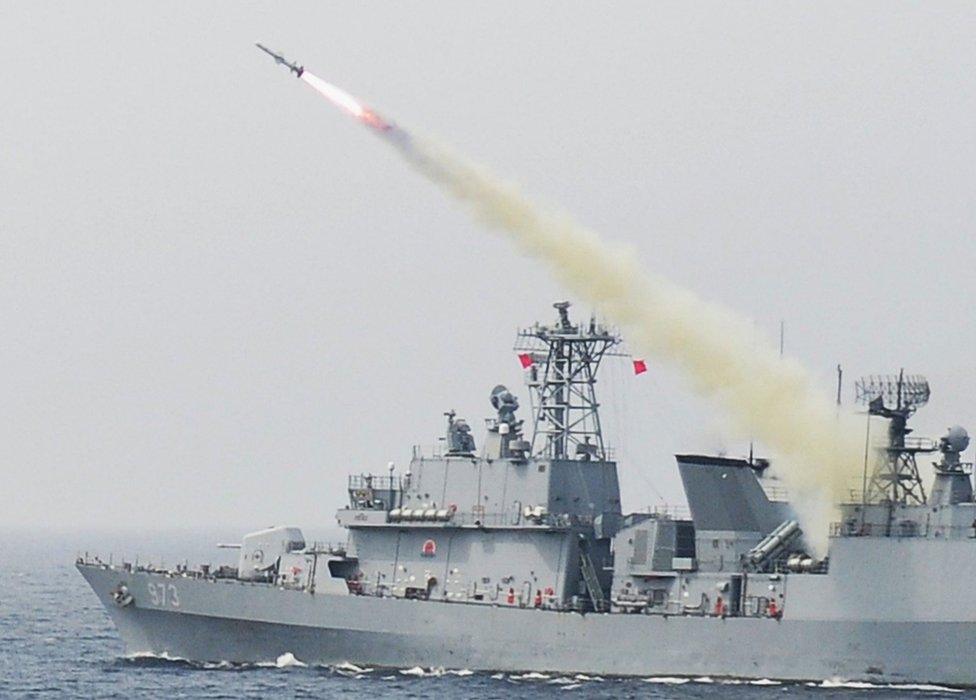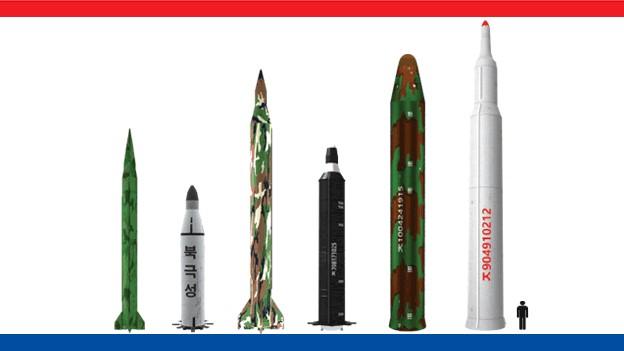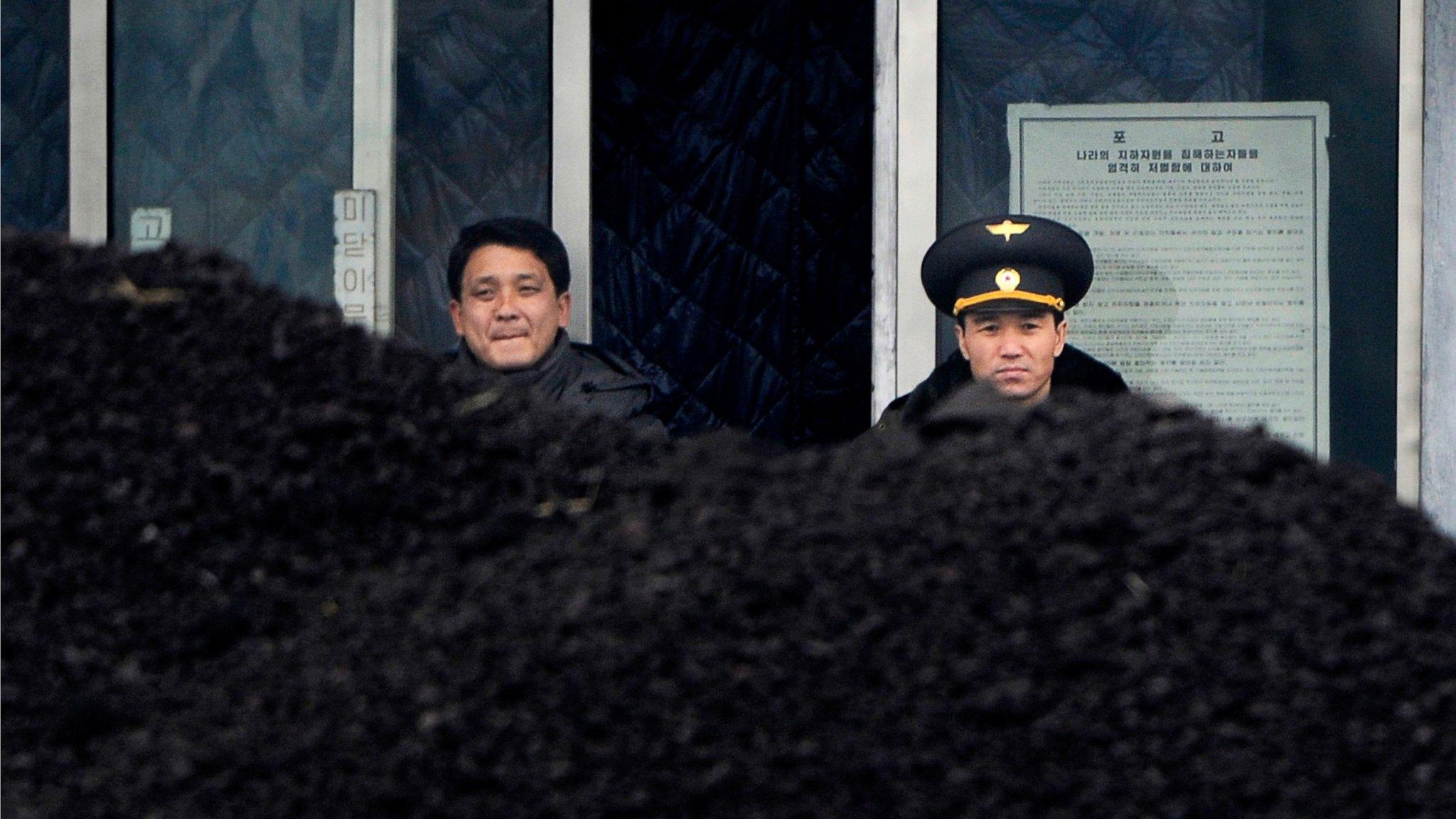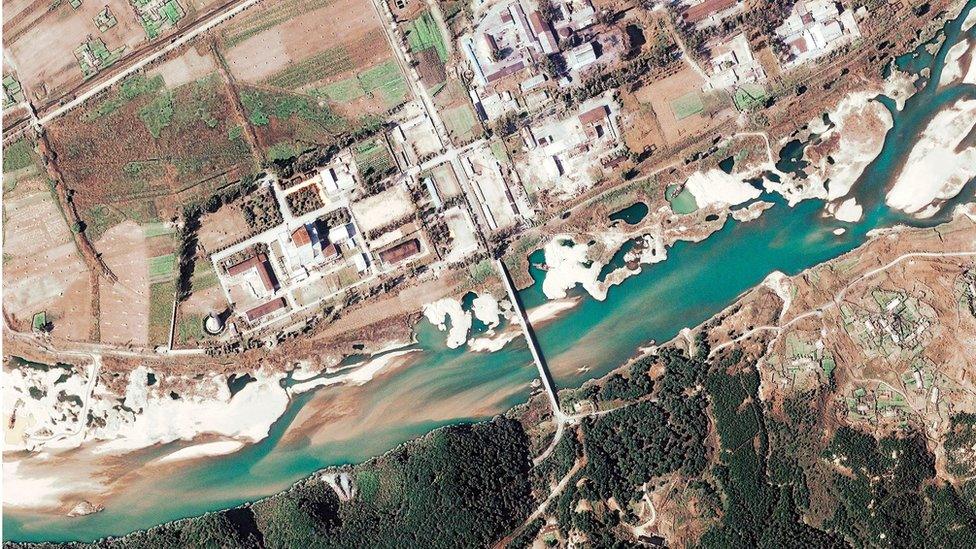Trump warns North Korea of 'severe' options over missile test
- Published
President Trump said North Korea faced consequences for its "very, very bad behaviour"
US President Donald Trump has warned North Korea that he is considering a "pretty severe" response following the country's long-range missile test.
"They are behaving in a very, very dangerous manner and something will have to be done about it," he said.
But he moderated his comments, saying: "We'll just take a look at what happens over the coming weeks and months."
Pyongyang tested an intercontinental ballistic missile with the potential to hit the US state of Alaska on Tuesday.
Despite the ICBM's relatively short flight and eventual crash into the sea, the test has been labelled a sharp military escalation by the US.
"I have pretty severe things that we're thinking about," Mr Trump said of a possible US response. "That doesn't mean that we'll do them."
He said other nations should challenge Pyongyang's "very, very bad behaviour".
Mr Trump was speaking in Warsaw, Poland, at a joint news conference with the Polish President Andrzej Duda. He is due to meet with other world leaders at the G20 summit in Germany on Friday.
The president's comments follow those of US ambassador Nikki Haley, who told the United Nations Security Council that the US was willing to use its "considerable military forces" on North Korea "if we must".
The US and South Korea have already stepped up military drills, firing missiles into the Sea of Japan in an apparent show of strength.
Pyongyang, however, said it would not negotiate over its missile programme unless the US ended its "hostile policy" against North Korea.

The South Korean destroyer Yang Manchun was seeing firing an anti-ship missile
Tuesday's ICBM launch was in defiance of a ban by the UN Security Council, but China and Russia, which are both veto-wielding members of the council, opposed the use of military force.
President Trump had already criticised China for its trade with North Korea, and is due to meet Chinese President Xi Jinping at the G20 summit this week.
Is the international community united on the issue?
South Korea's President Moon Jae-in has voiced concern that the North's nuclear and missile development is "proceeding much faster than expected".
Speaking in Berlin on Wednesday, where he met German leader Angela Merkel, he said they would "examine possibilities of ramping up sanctions".
At the UN Security Council meeting in New York, France's ambassador said it also favoured a new resolution on North Korea to tighten sanctions.
Why Trump only has bad North Korea options, as the BBC's Korea correspondent Steve Evans explains
Russia, which condemned the test, said the possibility of using military measures "should be excluded".
China's ambassador Liu Jieyi echoed similar sentiments and said "military means must not be an option".
He repeated China and Russia's proposal that North Korea should halt its missile and nuclear programmes in exchange for US and South Korean military exercises in the region being frozen. They also propose reversing plans to deploy a controversial anti-missile system in the South.
What does North Korea itself say?
The "US strategy of strength" combined with pressure and engagement "will never work", state news agency KCNA said.
Unless the US stopped its "hostile policy", North Korea would "never put the nuke and ballistic rocket on the negotiating table".
North Korea missile launch: What we do know and don't know
North Korean leader Kim Jong-un was earlier quoted as saying that Tuesday's launch was a "gift" to the Americans on their Independence Day, and that he had ordered officials to "frequently send big and small 'gift packages' to the Yankees".
Pyongyang said the Hwasong-14 ICBM had reached an altitude of 2,802km (1,731 miles) and flown 933km for 39 minutes before hitting a target in the sea.
North Korea, it said, was now "a full-fledged nuclear power that has been possessed of the most powerful inter-continental ballistic rocket capable of hitting any part of the world".
But while experts agree that the test shows Pyongyang has a long-range projectile, many are sceptical that its missiles can successfully deliver nuclear warheads.

What is an ICBM?

A long-range missile usually designed to carry a nuclear warhead
The minimum range is 5,500km (3,400 miles), although most fly about 10,000km or more
Pyongyang has previously displayed two types of ICBMs: the KN-08, with a range of 11,500km, and the KN-14, with a range of 10,000km, but before 4 July had not claimed to have flight tested an ICBM. It is not clear what differentiates the Hwasong-14

- Published20 April 2017

- Published4 July 2017

- Published10 August 2017
- Published10 August 2017
